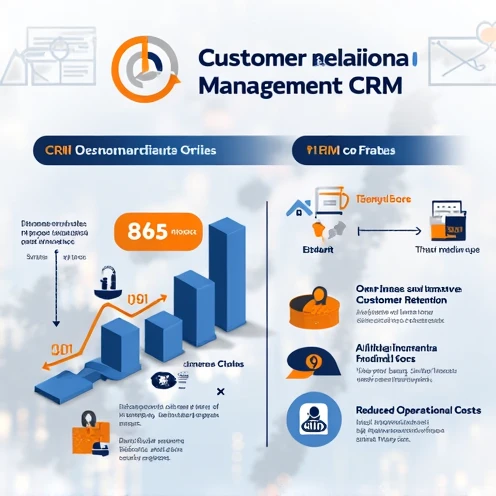Understanding CRM ROI and Its Impact on Business Growth
CRM, short for Customer Relationship Management, isn’t just a tool—it’s a strategy. CRM ROI (Return on Investment) refers to how much value you gain from using a CRM system compared to the cost of adopting and maintaining it.
Businesses use CRM to centralize customer data, streamline communication, and automate workflows. But what truly matters is how much return this investment brings. Measuring CRM ROI provides clear insight into how this technology influences your bottom line.
Why CRM Is More Than Just a Tool
At its core, CRM helps businesses better manage relationships. Gone are the days of scattered spreadsheets and sticky notes. Now, you have a centralized system to monitor leads, track sales progress, and maintain detailed customer records.
When you treat CRM as a strategic asset, it transforms how your company interacts with customers. That transformation becomes evident in your CRM ROI—higher customer satisfaction, faster response times, and more sales conversions.
The Simple Formula to Calculate CRM ROI
Understanding your CRM ROI begins with this basic formula:
(Net Revenue from CRM – CRM Cost) / CRM Cost × 100
For example, if you spend $15,000 on a CRM system and generate an additional $45,000 in revenue, your CRM ROI is 200%. This calculation helps assess whether your investment is justified, especially when presenting to leadership or investors.
But the benefits go beyond revenue alone. CRM improves efficiency, employee productivity, and customer lifetime value—all of which are crucial metrics that affect your overall ROI.
Retaining Customers Through Relationship Management
Did you know that retaining a customer is significantly cheaper than acquiring a new one? CRM tools track every interaction, preference, and complaint, allowing you to serve each customer personally.
This builds trust, reduces churn, and increases lifetime value. When customers feel heard and understood, they stay loyal—and that’s where CRM shines. You’re spending less to keep more, and that’s efficient business.
CRM Makes Forecasting Sales More Accurate
Accurate forecasting is essential for making smart decisions. With CRM, your sales team can analyze trends, behaviors, and deal progress in real time.
This predictive power reduces guesswork. It helps you know when to push deals, when to re-engage leads, and when to adjust your strategy. Accurate forecasts lead to better financial planning and, in turn, improved CRM ROI.
Workflow Automation Boosts Team Productivity
One major advantage of modern CRM systems is workflow automation. Tasks like sending follow-up emails, updating lead statuses, or assigning support tickets can be automated with ease.
This not only saves time but also minimizes human error. Your team focuses on high-value tasks like closing deals or nurturing prospects—improving output and boosting your CRM in the process.
Enhancing Cross-Team Collaboration
When all departments use the same CRM, data silos disappear. Sales, marketing, and support teams can work with shared information, allowing smoother handovers and coordinated strategies.
For example, marketing can pass on qualified leads based on real-time engagement data, and support teams can personalize interactions using customer history. The result? Happier customers and more efficient operations—both of which elevate CRM ROI.
Making Smarter Decisions with Data Insights
CRM dashboards and reports offer a wealth of insights. From customer lifetime value (CLV) to deal close rates, you can track every key performance indicator in one place.
When leadership has real-time access to performance data, they can make faster, smarter decisions. This agility helps the business pivot effectively, optimizing resources and driving stronger from the CRM investment.
CRM for Startups vs. Enterprises: ROI Perspectives
Startups benefit from CRM by organizing contacts and automating early-stage outreach. They often see quick wins in engagement and conversion rates, providing a fast.
On the other hand, larger enterprises leverage CRM to scale service delivery, manage complex pipelines, and personalize marketing at scale. For both types of businesses, ROI may look different in numbers—but the value is equally impactful.
Cloud CRM vs. On-Premise: Which Offers Better ROI?
Cloud-based CRM systems like Zoho, Salesforce, and HubSpot offer lower upfront costs, fast setup, and scalability. These are ideal for growing businesses that want flexibility and regular updates.
On-premise CRMs require more capital investment but offer tighter control over data and customization. In regulated industries, this might justify the cost. The key is aligning the platform choice with your strategic goals to maximize CRM ROI.
Common CRM Implementation Pitfalls to Avoid
A CRM system only works as well as its setup. Common mistakes that reduce include lack of training, poor data migration, and unclear objectives.
To avoid these, always involve end-users in the setup process, keep your database clean, and ensure your CRM aligns with business goals. A little preparation upfront prevents costly mistakes later.
Simple Ways to Maximize Your CRM ROI
Improving your ROI doesn’t require a full overhaul. Start by training your team, integrating your CRM with tools like email or marketing automation, and setting measurable goals.
Continuously optimize workflows and review performance data. Small, consistent improvements in how you use your CRM can lead to dramatic improvements in ROI.
Looking Ahead: The Future of CRM ROI
With artificial intelligence, machine learning, and even voice assistants entering the CRM space, ROI potential is set to skyrocket. Imagine predicting customer churn before it happens or generating sales emails automatically.
Businesses that stay ahead of these trends can expect even higher CRM ROI. The more you embrace innovation, the more returns your CRM will yield—both financially and strategically.
CRM ROI Is a Business Philosophy
CRM ROI isn’t just a financial metric—it’s a reflection of how well you serve your customers. By using CRM to build better relationships, automate processes, and gain insights, you create a more efficient and customer-centric organization.
When everyone in your business sees CRM as a tool for growth, not just management, you’ll unlock its full potential. And that’s when CRM ROI turns from a number into a long-term business advantage.


